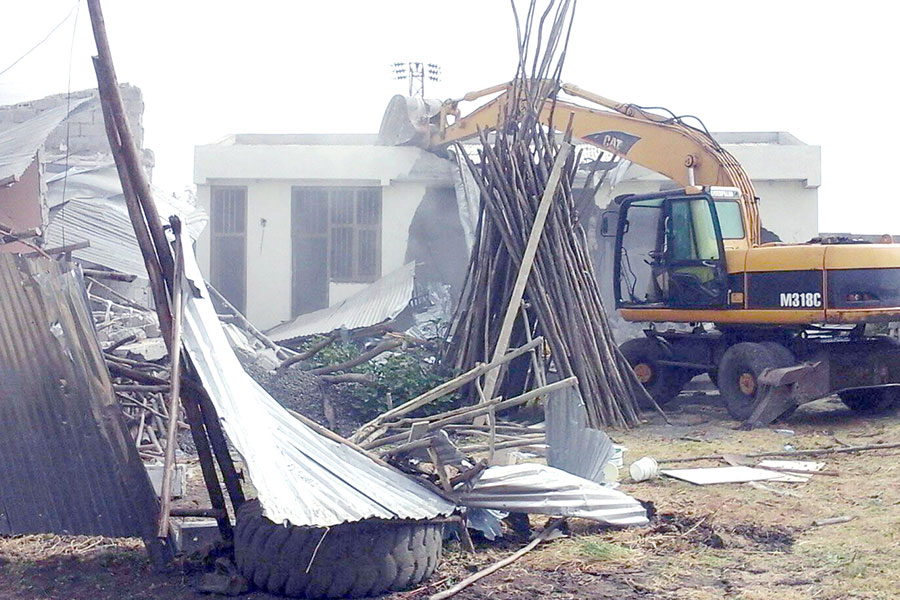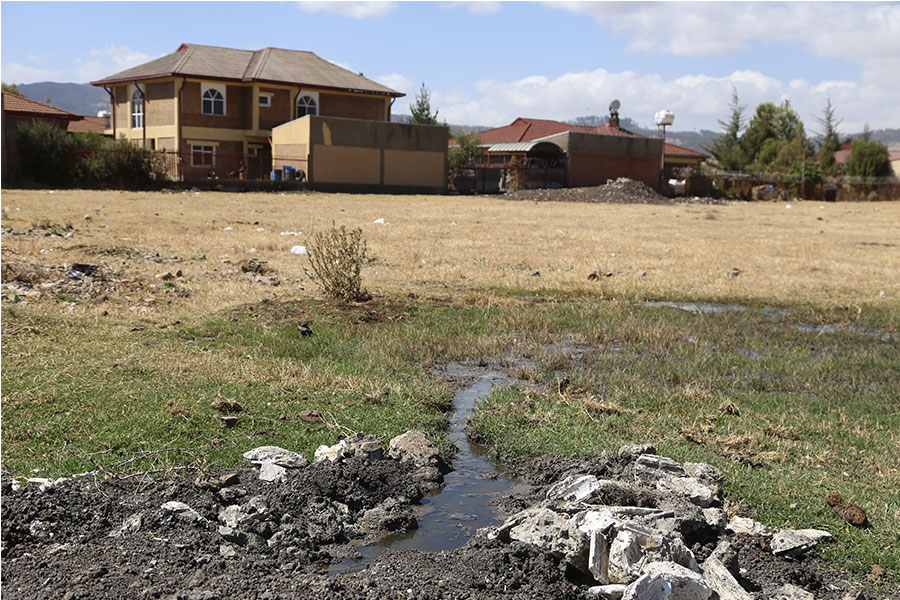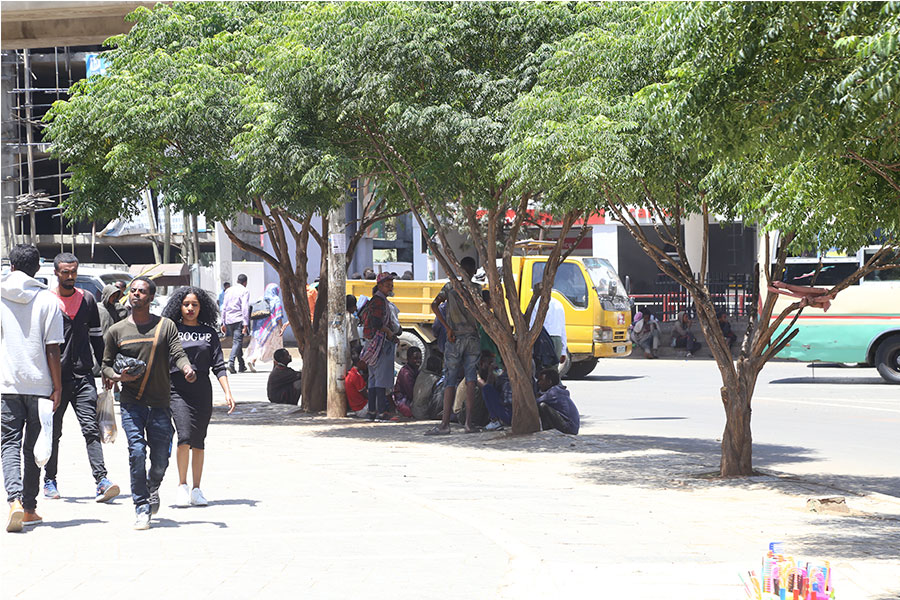
Radar | Nov 05,2022
Serkalem Baylegn, a 35-year-old single mother of three, lives in Legetafo Legedadi, Oromia Regional State, 11Km northeast of the capital.
Born and raised in Addis Abeba, she bought the property where she now lives fifteen years ago, after the house she had lived in was expropriated by the city government for development purposes.
“The cost of living in Addis Abeba was too high,” Serkalem recalls, explaining why she moved to Legatafo.
The 300Sqm property stood behind a church that she and her ex-husband bought for 38,000 Br, where they gradually built 12 new rooms that they rented out.
After separating from her husband about a decade ago, Serkalem became the sole provider of her family and supplemented her income by selling vegetables.
Her life was disrupted when bulldozers sent by city authorities arrived at her doors on the morning of February 20, 2019. As she and her neighbours clamoured to move their personal property out of their homes, the machines demolished her home where her children were born and raised.
Serkalem was not the only one who lost their home that week as the city moved to dismantle 3,685 homes deemed illegally built by the authorities.
While Serkalem claimed that she had never received any prior notice of the impending action, others noted that they were given notices about a week ago.
Anewar Mohammed, a resident of Burqa, 03 kebele, was issued a notice to vacate on February 8, 2019, and his home was demolished on February 19. The city administration claims that it had been in discussion with residents over the last six months, but people affected by the municipal action claim that they were unaware of any discussions.
The notices were sent by the Legetafo Legedadi City Administration’s Land Development & Management Agency that stated the land was needed for green space development, advised the residents to clear the properties themselves by a specific date and warned that the costs of clearing homes will be charged to the owners in cases of non-compliance.
The demolished homes lacked title deeds, but they had electricity and water utility hookups. The owners even paid land tax to the city administration.
The City Administration kept its word and arrived with bulldozers on February 19, 2019, clearing and demolishing nearly 40 houses over a 15,000Smq area, according to witnesses that live in the area.
The area was settled by people who bought the plots from farmers without titles or deeds of ownership. In the ensuing years, the authorities provided them with electricity, water and registered the homes and collected utility bills.
“We have even paid property taxes,” says Anwar.
A small clinic, Tafo Family Clinic, that operated in Legetafo for over a decade also fell to the demolition order.
“We didn't have a title deed for the land, but we had everything else, including a license for the clinic from the Oromia Health Bureau,” says Yeshiarge Abraham (MD), owner of the clinic.
“We were told that the land was needed for the expansion of a nearby school.”
In recent months, the Legetafo Legedadi area has seen the influx of displaced people that resettled in the aftermath of conflicts in Oromia and Somali regional states. In contrast to the demolition orders carried out against the residents, the authorities have promised to build 100-unit condominiums to house the refugees, an irony not lost by those who saw their properties demolished.
The residents claim that they have even made contributions in support of the refugees and that the Mayor had also thanked them for their efforts.
This measure by the City Administration was taken following the city council’s decision to implement a master plan, according to Habiba Siraj, mayor of Legetafo.
“The houses are illegal and built inside a designated green area, buffer zones and areas reserved for social and investment purposes,” Habiba told Fortune.
Some residents in Legetafo Legedadi were given a week’s notice to pack up and leave before their homes were demolished by the municipal authorities.
The master plan is a new one and follows the one that had served the city ever since the Special Zone Surrounding Addis Abeba of the Oromia Regional State was established in 2008.
“The demolition of houses built in violation of federal and regional laws are part of a larger operation,” says Melkesa Midega (PhD), head of the Oromia Regional Government Rural Land Administration & Use Bureau, pointing out to the 12,000 settlements in Legetafo Legedadi without title deeds that are slated for demolition.
Since last month, the administration of the Oromia Regional State has been demolishing houses deemed illegal in Shashemene, Burayu and Sebeta, a measure that is allowed under Ethiopian law.
According to Adissu Arega, head of the Political and Rural Mobilisation Bureau in the Oromia Regional State, 36,117 illegal settlements in 25 cities have been cleared so far
Urban property may be cleared by the government if deemed necessary for development purposes with the appropriate compensation awarded. When it comes to settlers who cannot provide title deed documentation though, they may be evicted from their residencies without any reimbursement.
The newly displaced residents are considered illegal settlers by the city administration because of the way they acquired the land. They bought the land from farmers before the area was incorporated into an urban zone. The initial purchases of the land from farmers, without following the proper land title and deed transfer requirements, is considered illegal.
But residents, as well as activists, claim that the city’s measure to evict residents that have lived in the area for 15 years and paid property taxes is a politically motivated move more than anything else. They cite as evidence the selective bulldozing of houses in neighbourhoods, while the administration claims that such areas are needed for developments, is a telltale sign.
The reason some of the houses were left standing is that the houses belong to farmers, which would require compensation before eviction, according to a statement by the Legetafo Legedadi Government Communication Affairs Office. Since the city has not accommodated a replacement for them, it has delayed their demolition, the Office’s statement said.
From a legal perspective, the residents can lodge grievances according to experts.
“Though the residents don’t have a legal claim, they have a rightful claim arising out of de facto use of the land,” says Yonas Tesfaye, legal expert and lecturer of law and development at Addis Abeba University.
He bases his argument on the fact that the City Administration condoned their existence by giving them government services and by collecting taxes from them for land use.
“This is not a normal case, and we shouldn’t follow normal procedures, but rather principles of justice and equity should prevail,” said Yonas.
“The government’s actions and omissions have contributed to claims of lack of moral and legal ground to evict these people.”
Human Rights Council, an independent human rights group in Ethiopia, has condemned the City’s actions and has asked that compensation and resettlement of displaced people should be made. It stated that such measures will result in social and human rights problems.
But the media attention that the measure has received and the outrage in public opinion is no solace to residents of the city who have received notices of evictions but have so far been spared dislocation.
For those whose houses have been demolished, such as Serkalem, the future is uncertain.
After placing her belongings and children in a neighbour’s house, Serkalem managed to put up a makeshift plastic shed and stayed the first night in the rubble of her house.
“I have nowhere to go,” she says.
PUBLISHED ON
Feb 23,2019 [ VOL
19 , NO
982]

Radar | Nov 05,2022

Fortune News | Sep 23,2023

Fortune News | Feb 23,2019

Featured | Mar 23,2019

Agenda | Mar 23,2019

Dec 22 , 2024 . By TIZITA SHEWAFERAW
Charged with transforming colossal state-owned enterprises into modern and competitiv...

Aug 18 , 2024 . By AKSAH ITALO
Although predictable Yonas Zerihun's job in the ride-hailing service is not immune to...

Jul 28 , 2024 . By TIZITA SHEWAFERAW
Unhabitual, perhaps too many, Samuel Gebreyohannes, 38, used to occasionally enjoy a couple of beers at breakfast. However, he recently swit...

Jul 13 , 2024 . By AKSAH ITALO
Investors who rely on tractors, trucks, and field vehicles for commuting, transporting commodities, and f...

Nov 1 , 2025
The National Bank of Ethiopia (NBE) issued a statement two weeks ago that appeared to...

Oct 25 , 2025
The regulatory machinery is on overdrive. In only two years, no fewer than 35 new pro...

Oct 18 , 2025
The political establishment, notably the ruling party and its top brass, has become p...

Oct 11 , 2025
Ladislas Farago, a roving Associated Press (AP) correspondent, arrived in Ethiopia in...